| Sailing Rigs for Canoes and kayaks
usually break into three groups.
There are auxilary sails for (usually)
seakayaks that are used to propel the boat downwind
only.
There are rigs to give a canoe high performance.
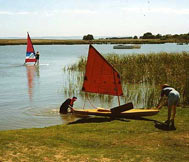 |
A rarely seen
variant is something in between - a no-fuss
rig that does not make the boat hard to handle
but provides enough power to sail reliably upwind
and down.
click images
to enlarge |
A rarely seen variant is something in between - a
no-fuss rig that does not make the boat hard to handle
but provides enough power to sail reliably upwind
and down. It should include a sensibly sized leeboard
so windward progress is reasonably efficient. It is
important that the leeboard is of a reasonable size
- boards much smaller than this have poor windward
performance.
This rig is the third type. It does not offer the
highest performance possible, but it is small enough
to fit inside the boat when not in use. The leeboard
necessary for upwind sailing is removed at the same
time as the mast support leaving the boat ready to
be used as a pure paddling canoe.
Recently I received an email from Trevor Killmier
who purchased the first set of the plans 10 or more
years ago. I'll let him tell the story . .
Hello Michael,
You may remember me from way back. I think we last
corresponded back in 95/96. You designed a drop in
sail rig for a fibreglass canoe we had.
| We
had a lot of fun out of that sailing canoe |
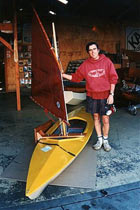
|
I was delighted to see a photo of
it on the Duck Flats website and I'm pleased that
you're marketing the rig again because I get many
inquiries about it.
We had a lot of fun out of
that sailing canoe (picture above - the rig was built
by David Wilson of Duck Flat) but I think in retrospect
the hull was quite unsuitable for sailing. It had
a very strong weathercocking tendency and I think
I wrote and told you that I managed to hurt myself
sailing it.
I eventually added a rudder and
was able to sail it myself again. My son also taught
himself to sail in it and had an enormous amount of
fun. However, it was impossible to right after a capsize
unless you were able to stand up and so I looked for
a more suitable hull. I had the plans of John Bull's
Peterboat sailing canoe and had started building one
of those before I hurt myself. Some years later, I
was able to resume that construction and completed
it, launching it in 98.
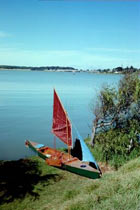 |
I have since
added a small tie on jib and an outrigger and
have been sailing regularly since 98. |
The plans call for a 40 ft.m²
lateen rig but I sail down at Clayton mostly and always
thought that was just too big. So, I simply transferred
your rig across to the new boat and it has proved
perfectly satisfactory. I have since added a small
tie on jib and an outrigger and have been sailing
regularly since 98. (picture above is launching day)
I am now building John Bull's little
Pete -- a single seat version of the same canoe --
and will transfer the rig over to that.
| The only drawback
is that I sometimes don't get to sail it because
I spend so much time talking to interested onlookers!
|
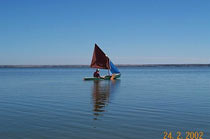
|
I regret not being in touch with
you earlier simply to convey how much pleasure I get
out of this boat. I guess I'm a minimalist at heart
but I'm sure there are many people out there with
much bigger boats, far heavier and more expensive,
who just don't get the amount of fun out of their
boats that I do out of mine. The only drawback is
that I sometimes don't get to sail it because I spend
so much time talking to interested onlookers! (picture
above - canoe at Barmera)
Rosemary and I have a van in the
caravan park at Clayton and another semipermanent
occupant of the park has told me that he wants to
build one. I haven't seen him for a while but have
told him that the rig is yours. Now I'll be able to
direct him to the site.
I have some photographs of the rig
on the Peterboat and if you would like to see them
or even use them for marketing purposes, I would be
happy to send them to you.
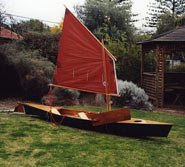 |
I have some
photographs of the rig on the Peterboat and
if you would like to see them |
Regards,
Trevor Killmier.
Wow - how lovely to hear from
you Trevor!!!
Your letter is EASILY one of the nicest things
I have read in a while. When I design something it
is often the case that I send the plans off, have
a bit of correspondence while the boat is being built
etc.
BUT ... to get a letter after 10 years showing
the damn thing works, that it has been moved from
boat to boat - AND MOST IMPORTANTLY - has fitted into
someones lifestyle so perfectly is just the best thing.
Thankyou so much!
If there are photos available of the different
incarnations of the rig I would love to see them.
Again thankyou for getting in contact!
Best Regards
Michael
Thanks Michael,
Yes, the damn thing really works!!!!! And works so
well for me. I'll hunt out some photos, scan them
and forward them to you. I know there are photos of
the rig on both the yellow canoe and the Peterboat
so I'll look for a selection.
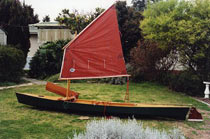 |
I just can't
understand why more people don't add a rig to
their canoes. Instant sailing boat: instant
fun. |
I'm glad you're still interested
in this idea - I just can't understand why more people
don't add a rig to their canoes. Instant sailing boat:
instant fun. Have you tried it on the Eureka
design?
Regards,
Trevor.
Note:
I think the boat in the photo has the sail hoisted
a little bit too high (compare the photos from Trevor
Killmier to the drawings). Keeping it a bit lower
will reduce the heeling force (less chance of capsizing)
and also reduce the load on the mast. Moving the
halyard a little further back on the yard (the wood
along the top edge of the sail) will cock the boom
up so it won't hit the user's head. That's the designer's
(my!) opinion, but Trevor has 10 years of experience
of the rig with a series of different boats in a
range of different conditions - so who am I to argue!
:-) I would suggest setting the rig up like the
drawings to start with, but if there are problems
with head clearance, move towards Trevor's setup.
Notes from
the Plan:
This rig is designed
to drop into a paddling boat, whether canoe or kayak.
As far as possible all the gear is removable from
the boat except for the mast step and three unobtrusive
fittings that will not interfere with the paddling
function. The blue jibsail in some of the photos is
not part of the plans.
| Many people have
a paddling boat and would like to gain a feel
for sailing at moderate additional cost. |
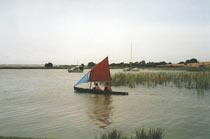
|
Many people have a
paddling boat and would like to gain a feel for sailing
at moderate additional cost. The objective of this
rig is to add the ability to sail to the function
of an existing boat without interfering with its existing
paddling performance.
If steering with a paddle take particular note of
the section at the end on sailing the kayak. It explains
how to adjust the leeboard to minimise the steering
loads.
A reefing point has been specified in the drawings
to enable the sail area to be reduced in marginal
conditions. It is not expected that the boat will
be able to sail upwind while reefed, though it will
still be able to sail well downwind.
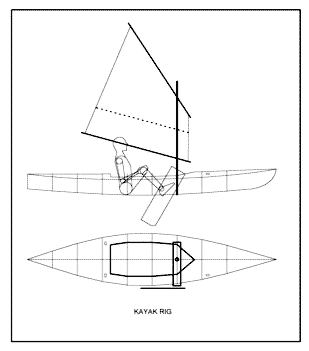
I would recommend doing some practice capsizes in
safe waters on a warm day to see if you can rescue
yourself or if you need outside assistance.
The spars and leeboard have been sized to fit inside
most boats or the leeboard can be swung forward to
be out of the way of the paddler should the boat have
to be paddled home.
MAKE SURE THE BOAT IS EQUIPPED WITH AND THAT YOU
WEAR APPROPRIATE SAFETY EQUIPMENT. KEEP AN EYE ON
THE WEATHER.
Another factor for consideration is that canoes and
kayaks can be very fast under sail - particularly
with the wind coming from astern. Take care not to
go excessive distances from your home base without
realising and setting yourself up for a very long
paddle home. A good way to avoid such problems is
to start toward the direction the wind is coming from
- then you will be able to enjoy a quick sail home.
Michael Storer Boat Design
Wooden Boat Plans
www.storerboatplans.com

|